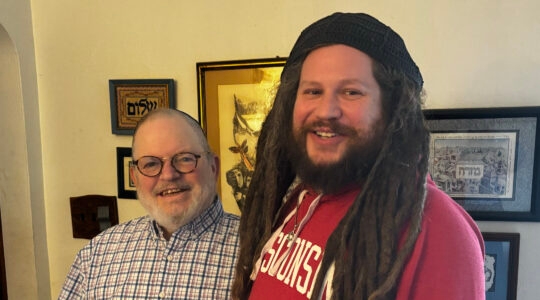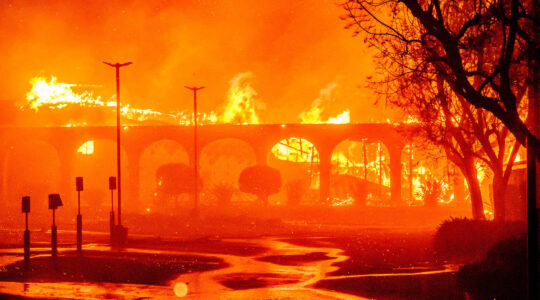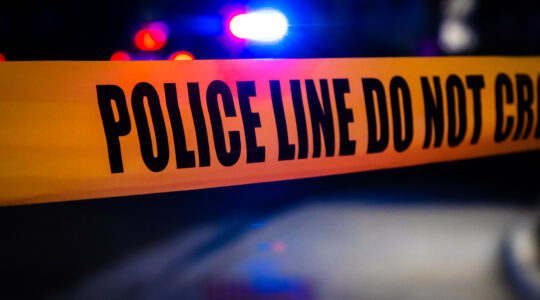WASHINGTON (JTA) – In the aftermath of her son Ari’s murder by an Arab gunman on the Brooklyn Bridge in 1994, Devorah Halberstam was introduced to a federal judge for the Southern District of New York with a longstanding interest in terrorism-related issues.
In the years since, Judge Michael Mukasey became a fixture in the life of Ari’s family, keeping a photo of the slain teenager on the mantle in his chambers, meeting regularly with his mother and in March, receiving the memorial award established in Ari’s memory.
Mukasey even attended the weddings of Ari’s siblings, one of which required him to endure torrential rainstorms during the outdoor ceremony. But he stayed until its conclusion, Halberstam said, even though he was drenched.
“That is the kind of a person he is,” Halberstam said. “He’s an immaculate human being. You don’t find people like that.”
Halberstam and Mukasey would meet each year around Rosh Hashanah in his judge’s chambers in Lower Manhattan. This year’s meeting was scheduled for Monday, but the day before Mukasey called to say he had an urgent engagement in Washington: President Bush would be introducing him as the White House’s pick to be the next U.S. attorney general.
Those who know the retired federal judge say Mukasey, an Orthodox Jew, is a political conservative who kept his politics and religion out of the courtroom.
That’s in marked contrast to his predecessor, the scandal-plagued Alberto Gonzales, who resigned this month despite Bush’s best efforts to retain him. Gonzales’ tenure was marked by his loyalty to Bush and oft-repeated only-in-America story as the child of Mexican immigrants.
As a judge, Mukasey broke with the White House on a key anti-terrorism issue by ruling that a suspect must have access to a lawyer. And unlike some other judges, he has abjured involvement in Jewish advocacy.
“Some judges have improperly remained active in Jewish organizational life while they were on the bench,” said Marc Stern, counsel to the American Jewish Congress. “It’s a testament to his probity that he was not among them.”
That does not mean his Judaism is not deeply felt.
Mukasey, 66, is a lifelong congregant at Kehillath Jeshurun on New York City’s Upper East Side. He was educated at its Ramaz school, and his wife for a time was the school’s headmistress. He is close friends with another congregant, Jay Lefkowitz, a top Washington lawyer and a veteran of the Soviet Jewry advocacy movement who is Bush’s special envoy for human rights in North Korea.
Lefkowitz rushed to praise the selection, as did another top Jewish conservative, Weekly Standard editor William Kristol.
Orthodox groups were not shy about claiming Mukasey.
“He’s a man of impeccable character, and it’s nice to see someone from the community nominated to such an important position,” said Nathan Diament, the Orthodox Union’s Washington director.
Mukasey would be the second Jewish attorney general. Ed Levi, who served under President Ford in the mid-1970s, also was known for his independent streak.
Mukasey has close ties, dating back to his days as an assistant U.S. attorney in the 1960s, to Rudy Giuliani, a leading contender for the Republican presidential nomination. The former New York City mayor lost no time in endorsing the nomination, raising the possibility that Mukasey could straddle two administrations should Giuliani win the presidency in November 2008.
A defendant in the first 1993 World Trade Center bombing tried to make Mukasey’s Kehillath Jeshurun membership an issue. He filed an appeal to remove Mukasey as a judge, arguing that his allegiances would prejudice him against Muslims.
Appellate judges dismissed the concerns as “utterly irrelevant.”
Similarly, in the appropriate forums, Mukasey is not uncomfortable about baring his conservative credentials. In a Wall Street Journal opinion piece last month, Mukasey lent considerable intellectual weight to Bush administration arguments that applying conventional legal mores to terrorism suspects is counterproductive.
“The rules that apply to routine criminals who pursue finite goals are skewed, and properly so, to assure that only the highest level of proof will result in a conviction,” Mukasey wrote. “But those rules do not protect a society that must gather information about, and at least incapacitate, people who have cosmic goals that they are intent on achieving by cataclysmic means.”
Yet in the courtroom, Mukasey strictly adhered to case law and precedent, according to those who worked with him.
“In a criminal sphere I saw that he was very fair, and gave the defense a chance to try its chase,” said Baruch Weiss, a criminal defense lawyer who during his stint as a federal prosecutor appeared before Mukasey. “He wasn’t afraid to rule on behalf of the government or the defense.”
Weiss said the only sign he saw of Mukasey’s Judaism was that “he knew how to pronounce my name, unlike a lot of other judges.”
Mukasey’s best-known dissent from Bush administration dogma came in a 2002 ruling in the case of Jose Padilla, a U.S. citizen detained as an enemy combatant. He allowed Padilla’s indefinite detention, but rejected the government’s request to sequester him from his lawyers.
“Padilla’s statutorily granted right to present facts to the court in connection with this petition will be destroyed utterly if he is not allowed to consult with counsel,” Mukasey ruled.
Mukasey’s extensive dealings with terrorism underscore how much that issue has become the Bush administration’s focus in its final days, Stern said.
“What obviously propels the Mukasey nomination forward, because there are lots of people who hold his views on terrorism, is that he’s strong but credible and that shows how strong those issues of have become to the administration,” he said.
Bush made the background in terrorism central to his nomination.
“Some of Judge Mukasey’s most important legal experience is in the area of national security,” Bush said, standing alongside Mukasey in the Rose Garden. “Judge Mukasey presided over the trial of the terrorist known as ‘the Blind Sheik,’ and his co-defendants in the conspiracy to destroy prominent New York City landmarks, including bombing the World Trade Center in 1993. Before the 9/11 attacks, this was one of the most important terrorism cases in our nation’s history, and the verdict in that case was affirmed on appeal. In affirming the convictions, the appeals court signaled out the judge for praise.”
In accepting the nomination, Mukasey also focused on terrorism.
Upon joining the Justice Department as an assistant U.S. attorney 35 years ago, he said, “Our foreign adversaries saw widespread devastation as a deterrent; today our fanatical enemies see it as a divine fulfillment.”
The focus concerned Stern, who noted that the Justice Department’s bailiwick is much broader than terrorism.
“He’s a cipher on abortion, he’s a cipher on civil rights, he’s a cipher on all the hot-button issues that move the administration’s base,” Stern said.
That led the AJCongress to call for a rigorous confirmation process.
“President Bush has selected an individual who appears to be beyond ethical reproach and who is not narrowly partisan,” the group said in a statement. “Michael Mukasey also appears to be free of the thrall of social conservatives. But though on all three scores he would be a marked improvement over the incumbent, his confirmation should not be a formality.”
U.S. Sen. Charles Schumer (D-N.Y.), a key member of the Senate’s Judiciary Committee, has already joined the committee’s chairman, Sen. Patrick Leahy (D-Vt.), in promising an expansive confirmation.
Still, Mukasey is likely to get the job – he was one of four candidates Schumer recommended to the White House, and has not irked Democrats as Gonzales had through his department’s prosecutions of voter fraud cases that seemed to target close races involving Democrats – and that fell apart more often than not.
“It is gratifying that the White House didn’t go for a nominee that they knew in advance would be controversial,” said Sammie Moshenberg, the director of the National Council of Jewish Women’s Washington office.
For Devorah Halberstam, Mukasey is the perfect pick.
“His chambers really depict who he is – clean, immaculate. You would never see even a dust anywhere around. It was the most immaculate office. That is the kind of a person he is. He’s an immaculate human being,” she said.
“I don’t think there was anybody in this country, certainly back then, who was so really on the mark on issues of terrorism. He was the most unique person. I think he understood it better than anybody.”
Staff writer Ben Harris in New York contributed to this report.
JTA has documented Jewish history in real-time for over a century. Keep our journalism strong by joining us in supporting independent, award-winning reporting.





